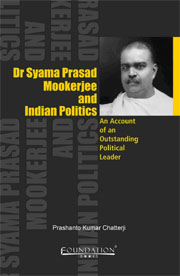Book contents
- Frontmatter
- Contents
- Preface
- 1 Dr Syama Prasad Mookerjee as the Finance Minister of Bengal, 1941–1942
- 2 Syama Prasad and Hindu Mahasabha's Ascendancy in Indian Politics, 1938–1944
- 3 Syama Prasad and Hindu Mahasabha's Transitory Resuscitation after Reverses, 1945–1947
- 4 Syama Prasad's Achievements as the Central Cabinet Minister, 1947–1950
- 5 Syama Prasad and Establishment of Bharatiya Jana Sangh, 1950–1953
- 6 Conclusion
- Appendix I
- Appendix II
- Appendix III
- Appendix IV
- Appendix V
- Appendix VI
- Appendix VII
- Bibliography
- Index
4 - Syama Prasad's Achievements as the Central Cabinet Minister, 1947–1950
Published online by Cambridge University Press: 05 February 2012
- Frontmatter
- Contents
- Preface
- 1 Dr Syama Prasad Mookerjee as the Finance Minister of Bengal, 1941–1942
- 2 Syama Prasad and Hindu Mahasabha's Ascendancy in Indian Politics, 1938–1944
- 3 Syama Prasad and Hindu Mahasabha's Transitory Resuscitation after Reverses, 1945–1947
- 4 Syama Prasad's Achievements as the Central Cabinet Minister, 1947–1950
- 5 Syama Prasad and Establishment of Bharatiya Jana Sangh, 1950–1953
- 6 Conclusion
- Appendix I
- Appendix II
- Appendix III
- Appendix IV
- Appendix V
- Appendix VI
- Appendix VII
- Bibliography
- Index
Summary
SECTION-1: Interregnum between Bengal Ministership and Central Ministership
Syama Prasad's resignation made the fall of the Haq Ministry inevitable. When the Budget for the year 1943 was introduced by Fazlul Haq, who had taken over the Finance portfolio following Syama Prasad's resignation, it was apparent that the ministry would face quite a few challenges during the budget session. The strength of the Opposition was increasing daily. The League and the Europeans had combined, and a number of Muslims and Scheduled Caste members joined the Opposition after deserting the ministerial party. The official Congress party continued to attack the Ministry and made it clear that its continuance depended on its charity. The Communist party was carrying on a persistent propaganda against the Ministry and it joined hands with the League for this purpose. Governor Herbert urged Haq to bring in the Muslim League. A coalition with the League was acceptable to the truncated Ministry as well as to Syama Prasad who had always been prepared “to have a ministry representing all parties”. But the League “Maintained that while it was prepared to cooperate with any Non-Muslim party, it would never join any ministry along with the non-Muslim League Muslims”. This was in accordance with Jinnah's contention that the Muslim League was the sole representative organisation of the Muslims of India and the non-League Muslims were untouchables. Just before the Budget proceedings were about to be concluded, Haq was summered by the Governor on the evening of 28 March.
- Type
- Chapter
- Information
- Dr Syama Prasad Mookerjee and Indian PoliticsAn Account of an Outstanding Political Leader, pp. 214 - 266Publisher: Foundation BooksPrint publication year: 2010



